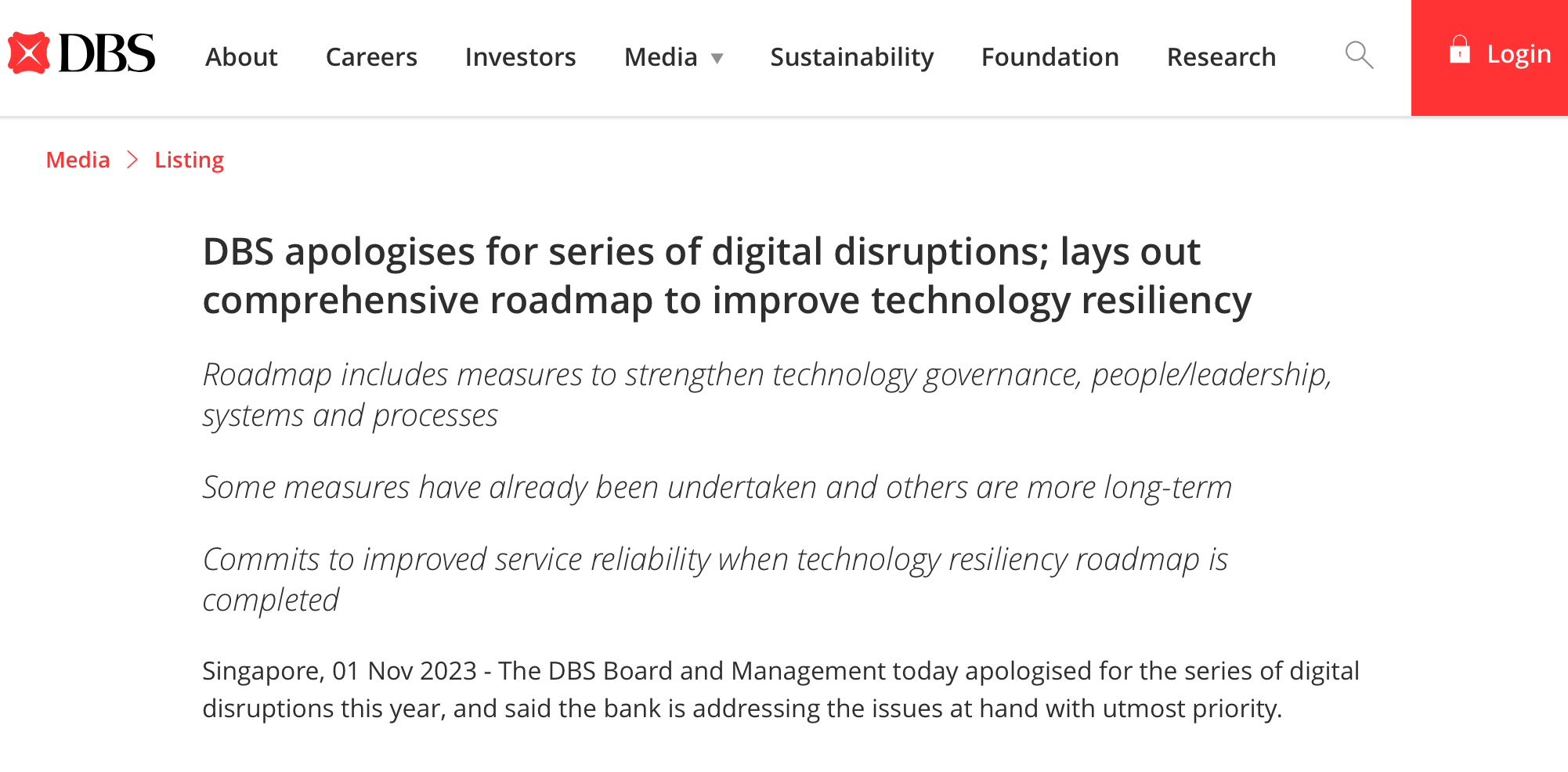Recently, DBS Bank, Singapore's largest financial institution, was hit by a six-month IT change freeze initiated by the Monetary Authority of Singapore (MAS) to ensure that banks can focus on restoring the stability of their digital banking services. During this period, DBS will not be allowed to make new business investments or reduce the size of its branch and ATM network in Singapore. This incident is not only a serious warning to DBS Bank, but also a stark reminder of the risks and challenges that the entire financial industry may encounter on the road to digital transformation.

event review
DBS Bank's digital banking service interruption: At multiple time points in 2023, including March 29, May 5, September 26, October 14, and October 20, DBS Bank's digital banking service experienced several major interruptions, affecting the daily banking operations of a large number of customers. These service interruptions highlight some shortcomings of DBS Bank in terms of system resilience and technical risk management.
MAS's Non Core IT Change Suspension: In response to DBS Bank's service interruption issue, the Monetary Authority of Singapore (MAS) has implemented a six month non core IT change suspension for DBS Bank from November 1, 2023. This decision aims to focus DBS Bank's efforts and prioritize addressing existing technical issues in order to restore and enhance the stability and resilience of its digital banking services.
DBS Bank's Independent Review and Technical Resilience Roadmap: In April 2023, DBS Bank conducted an independent digital banking service review, which revealed the shortcomings of DBS Bank in system resilience, event management, change management, and technical risk governance. To address these issues, DBS Bank has developed a technical resilience roadmap, which has been reviewed and approved by MAS. MAS expects the senior management of DBS Bank to be responsible for the identified errors and take effective measures to ensure that similar issues do not recur.

analysis
Direct impact on DBS Bank:
Increase in capital requirements: DBS Bank is required to increase its regulatory capital by approximately SGD 1.6 billion, which undoubtedly increases the financial pressure on the bank and also reflects the strict requirements of regulatory authorities on technical risk management for financial institutions/
The aggravation of operational risk: MAS has retained a multiplier of 1.8 times the risk weighted assets for DBS Bank's operational risk, which will affect DBS Bank's operational risk management and capital planning, and may have a certain impact on its future business expansion and strategic planning.
Impact on consumers and the market:
The test of consumer trust: Frequent service interruptions may affect consumers' trust in DBS Bank and also raise doubts about the reliability of digital banking services
The impact of market competition pattern: DBS Bank may face a decline in market competitiveness during the suspension of non core IT changes, while other banks may take this opportunity to increase market promotion and compete for market share.
Regulatory impact:
Improvement of regulatory standards: This event may prompt regulatory authorities to further improve and strengthen their regulatory standards and requirements for technical risk management of financial institutions.
Innovation in regulatory technology: Regulatory agencies may take this opportunity to explore the use of more new technologies such as artificial intelligence and blockchain to improve regulatory efficiency and real-time monitoring capabilities.
Industry inspiration
Emphasize the resilience and stability of digital banking platforms:
Financial institutions should ensure the resilience and stability of their digital services while pursuing innovation and efficiency, in order to prevent unforeseeable events such as service interruptions and safeguard consumer interests and market stability.
Strengthen technical risk management and emergency response mechanisms:
Financial institutions should strengthen technical risk management, establish sound emergency response mechanisms, ensure timely and effective problem-solving when facing technical problems, and reduce the impact on consumers and the market.
Improving transparency and communication efficiency:
Financial institutions should improve the transparency of service status and report service issues to consumers and regulatory agencies in a timely manner to safeguard consumer rights and market trust. At the same time, communication with regulatory agencies should also be strengthened to ensure that both parties reach consensus on technical risk management and market regulation, and jointly promote the healthy development of the industry.
Strengthening regulatory cooperation and innovation:
Regulatory agencies and financial institutions should strengthen cooperation and explore the use of new technologies and methods to improve regulatory efficiency and effectiveness, such as using big data, artificial intelligence, and other technologies to monitor and analyze market risks in real-time, promoting the sustained and healthy development of the industry.
Promote the development and improvement of industry standards:
By formulating and improving relevant industry standards, clear guidance and norms can be provided for financial institutions in the process of digital transformation, and regulatory agencies can also better execute market regulation and protect consumer interests
conclusion
The IT change freeze at DBS Bank highlights the potential risks in digital transformation and provides valuable lessons for fintech innovation. The significance of financial innovation lies not only in the efficiency and convenience it brings to financial services, but also in how it strengthens the resilience of the financial system and consumer confidence. A stable financial information and innovation environment should encourage innovation while ensuring safety, balancing risk management and business development. This incident has strengthened the role of regulation not only in supervision and punishment, but also in providing guidance and support in the information and innovation ecosystem to promote the healthy growth of financial technology. Through this approach, financial innovation not only promotes service innovation, but also becomes a solid foundation for maintaining the stability of the entire financial ecosystem.